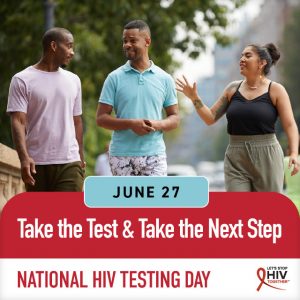A Note from Dr. Avery
Good things are happening.
The U.S. Department of Health and Human Services (HSS) recently posted updated guidelines, which now incorporate chest/breastfeeding options for people living with HIV.
Recently, the HHS has found that the risk of transmission to children is very low, if the child-bearing person living with HIV has had sustained viral suppression. Risk of transmission in virally suppressed, lactating parents is:
- 0%, with the use of formula feeding.
- Less than 1% when nursing for those living with HIV if their viral load is undetectable.
As a healthcare provider, it’s important to address the specific needs of individuals living with HIV who are considering breast/chest feeding, regardless of their gender identity.
Many individuals who identify as gender nonconforming may experience gender dysphoria, and the experience of pregnancy and breast/chest feeding can exacerbate this condition. To ensure the healthy development of the fetus, hormone therapy must be temporarily discontinued. The cessation of hormone therapy can bring about physical and mental changes that may trigger or intensify gender dysphoria.
Furthermore, individuals who have undergone top surgery or practice binding may encounter challenges in milk production. For these individuals, the option of breast/chest feeding may not be feasible if an individual is unable to produce sufficient milk for their baby.
Considering these factors, it is crucial for our gender nonconforming patients living with HIV who plan to breast/chest feed to receive comprehensive support from a medical team experienced in addressing the unique needs of pregnant and lactating individuals who identify as gender nonconforming. This support should encompass both the expertise of a healthcare team specialized in HIV treatment and a team that understands the intricacies of caring for pregnant and lactating gender nonconforming individuals.
Please encourage your clients take the time to read about this important update on our blog: Chestfeeding, Breastfeeding and HIV: What You Need to Know
As always, keep up the good work,
Ann K. Avery, MD
The MetroHealth System
Division Director of Infectious Disease
Positive Peers Principal Investigator
Current editions
Current Editions and Resources
Happy Pride Month

Pride matters because stigma, discrimination, unemployment, and homelessness are everyday realities for LGBTQIA+ people. Pride matters because we need to connect, learn, and are much more powerful and resilient as one.
Pride matters because our health depends on it.
Finding a healthcare provider is not always easy for LGBTQ+ individuals. Many LGBTQ+ people report providers don’t understand issues involving their sexuality or gender identity, and some providers even refuse to provide care. Sadly, this is true for our HIV community as well.
Consequently, patients may avoid discussing their health concerns or seeking healthcare altogether. These barriers contribute to increased health issues, including HIV transmission and prevalence.
As healthcare providers, we must actively participate in Pride because creating an inclusive healthcare environment doesn’t just take care of our LGBTQ+ patient population; it takes care of all of us.
Our Mantra: Body, Mind, and Spirit.
At Positive Peers, we understand the importance of holistic health, encompassing the Body, Mind, and Spirit. Our app is designed to help individuals living with HIV improve their quality of life by focusing on these three aspects.
The app features a built-in wellness tracker that serves as a tool for goal setting and rewards based on these aspects. By claiming points for actions, users can visualize their progress and feel a sense of accomplishment. This visual representation of progress can be highly motivating and make the process of maintaining positive habits enjoyable.
We believe that incorporating a holistic approach to health, focusing on the Body, Mind, and Spirit, is crucial for individuals living with HIV. It encourages users to take their medication consistently, engage in activities that nurture the mind, and connect with a supportive community. By engaging with the app, they can actively work towards improving their quality of life while living with HIV.
Please share our new post
Caring for your Body, Mind, and Spirit while living with HIV

The Positive Peers app assists users with habit tracking. A habit tracker is one of the simplest ways to make sure users are keeping up with a schedule of healthy decisions, such as taking the meds daily, caring for their mental well-being, and making social connections.
- Reminds users to act with a visual cues
- Motivates users by showing the progress they are making
- Creates a satisfying checkmark for each accomplishment
Share our Habit Tracking tricks with your patients: Building Healthy Habits with Positive Peers
June 27 is National HIV Testing Day
We encourage HIV testing on National HIV Testing Day and every day to ensure people get tested for HIV, know their status, and get linked to care and treatment services. Make sure you have Positive Peers palm cards and swag to hand out for after care services.

Increasing Enrollment
Please make sure people in your community know about Positive Peers. Here are some ways you can increase enrollment in the app:
- Make sure all HIV care providers in your community know about Positive Peers
- Provide HIV care providers with palm cards for them to give out in their clinics
- Ask HIV providers if they want to speak to us to learn about the value our app provides for those living with HIV
- Post about Positive Peers on your social media
Key Health Partner Badges
Our Key Health Partner badges are available for download and ready to be used on your website. Posting to your site boosts awareness, attracts new users, and gets more people into care.
Download here: https://positivepeers.org/health-partner/key-health-partnerresources/
Get Social
Follow us
Follow us on social media (Facebook, Instagram, Twitter, and LinkedIn) and tag us in your posts using @postivepeers4u and #postivepeers
Not socially savvy? We are.
Ask us how we can run social advertising in your community to help promote your services and partnership in our Positive Peers social accounts.
For more information, contact:
positivepeers@metrohealth.org.
Invite us to present about Positive Peers
We are willing to participate in virtual meetings with your Ryan White Planning Council or other community planning groups, staff meetings in HIV clinics, and HIV social work networks. Consider inviting us to your groups.
If you are interested, please contact positivepeers@metrohealth.org.